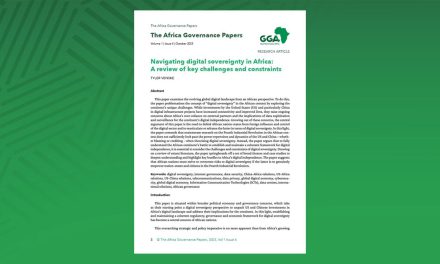
People queue to collect bucket loads of water from a borehole drilled by Non-Governmental Organisations (NGO) in Glen View Township, Harare, on September 24, 2019. The Morton Jaffray Water Treatment Works, built more than 60 years ago, is subject to regular breakdowns, and loses about 55% of treated water through leakage. Photo: Jekesai NJIKIZANA / AFP
Acknowledging the existence of vexing truths
The vexation evidently stems from the sour truth that some African leaders have maintained Africa in a state of underdevelopment. Hence African scholars must embrace this rude reality or resign to political denialism where such leaders are defended no matter the facts. Decolonial scholars, in the main, have a tragic wish that Walter Rodney’s truth that Europe underdeveloped Africa through slavery, imperialism and colonialism remains the only truth in the basket of truths. It is a strong temptation for some of these scholars to be possessed by the tragic fantasy that the African condition of poverty and underdevelopment could solely be understood in terms of settler colonialism and imperialism that Europeans deployed to underdevelop Africa. As such, that some African leaders have become native colonisers of Africans is a shame.
For instance, when commentators such as Greg Mills observe that: “The main reason why Africa’s people are poor is that their leaders have made this choice,” the decolonists wish that this was false in all circumstances. Mills continues to offer that: “The record shows that countries can grow their economies and develop faster if leaders make sound decisions in the national interest”, which most African leaders have not done.
In the case of Zimbabwe what would embarrass and shame the decolonists is when Zimbabweans, suffering under the native colonialism of the Zanu-PF government publicly exclaim that life was far much better under the Rhodesian settler colonialism of Ian Smith. It is a piercing indictment of African liberation sensibility when, like some biblical Jews in the long desert to Canaan who demanded that Moses returns them to Egypt, Africans begin to loudly express the wish to return to the colonial days. Clearly, decolonial scholars need the courage to name and shame native colonialism even as we collectively reject this distortion of history that seeks to whitewash the crimes of European colonialism. African scholars do not have to choose between European colonialism and native colonialism; they rather need to confront the latter as vehemently as Africans fought the former. Choosing to defend native colonialism is promoting mediocrity.
Colonial economic and political conditions are at their zenith when a few powerful individuals monopolise the polity and the economy at the expense of the majority in any country. It takes some decolonial courage like that of Chinua Achebe who, in the case of Nigeria, argued that: “The trouble with Nigeria is simply and squarely a failure of leadership. There is nothing wrong with the Nigerian land or climate or water or anything else, but the failure of the leaders to work and lead in the national economic and political interest of African countries.”
Achebe’s judgement of the Nigerian political and economic condition is true of many African countries such as Zimbabwe that are failed or failing states whose polities and economies are in crisis. I must add to Achebe that the African leadership crisis is accompanied by a crisis of followership where genocidal and corrupt African leaders have armies of flatterers and choirs of sycophants that lionise them and urge them on in their tyranny and thievery. Achebe is correct in that, as Africans: “We have displayed a consistent inclination since we assumed management of our affairs to opt for mediocrity and compromise, to pick a third and fourth eleven to play for us.”
Looking at such African violations of Africa, using decoloniality as a philosophy of liberation, one must swallow Afrocentric pride and construct the painful vocabulary of naming, not just European colonialism that underdeveloped Africa, but also native colonialism where some African liberation movements have degenerated into native colonialist and genocidal cults whose violence and corruption smell to the high heavens.
Any discerning African that has watched the recent Al Jazeera documentary, The Gold Mafia, will admit that native colonialism, where African leaders through their families, friends, and fronts siphon a country’s resources and launder public money exists. Vividly represented in the Zimbabwean political and economic condition is the African tragedy of coloniality where Rhodesian settler colonialism, at the political independence of Zimbabwe in 1980, gave way to native colonialism where the ruling elite did not only monopolise political power but took ownership of the economy and resources of the country that they conspicuously consume, swimming in opulence and prosperity while the majority of Zimbabweans are drowning in abject poverty and unspeakable misery. In the way the natural resources and the public money of Zimbabwe are squandered by the top leadership, Zimbabwe is a crime scene.
The ruling elite is loud about how Western-imposed sanctions hurt the Zimbabwean economy and deafeningly silent on The Gold Mafia, in the shape of the ruling elite, that daily bleed the economy and the polity of Zimbabwe. Their unbridled corruption has been normalised into a political culture that has become the very definition of the country. Achebe called such leaders and their political parties and factions the ‘cult of mediocrity’ that lead by failing and that give African leadership itself a bad name. Leadership is so defamed by the leaders that it has become easy for Zimbabweans to loudly exclaim that Rhodesian colonialism was far better than the present regime, which is a political tragedy.
Enter the cult of mediocrity
It is that titanic decolonial philosopher, Frantz Fanon, who made the telling remark that most African postcolonial leaders have sold their countries to the lowest bidder, stupidity itself. Africa has telling examples of how the continent has elected to positions of leadership some leaders have elevated idiocy, in the Greek sense of the word, into sanctity. From Idi Amin to Mobutu, amongst many, the continent has fronted leaders that tragically affirm the colonial and racist stereotype of Africans as unwise, violent, and incorrigibly dishonest.
That Zimbabwe has been colonised by a cult of mediocrity that operates as native colonialists is not only confirmed by government critics, political activists and concerned scholars. It is a truism that is also confirmed by the leaders of the cult and their spokespersons. In shocking video footage Mnangagwa himself declares that as the ruling party: “We are the people, we are the army, we are the police, we are the intelligence, we determine who can do mining in Zimbabwe, we determine who can build a road in Zimbabwe, no other party can do so.” This is not only the vaunting of a gold mafioso, but it is also the celebration of a native colonialist regime that has effectively privatised the security sector, the economy, and the polity that they are weaponising against the people of Zimbabwe.
The judiciary and the legislature, critical arms of good governance, have also collapsed into instruments of the tyranny of mediocrity that has enveloped Zimbabwe. The principle of separation of powers has been thrown down into the lavatory as the party has made itself into the state and effectively captured for partisan reasons state institutions that were supposed to defend the country, not the party.
As the country approaches another national election in August this year, the ruling cult has used its parliamentary majority to pass what is called the Patriotic Bill which will, if passed into law, criminalise the criticism of government and its leaders. Patriotism which is the sentiment and passion of one’s love and devotion for the country has been colonised and collapsed into coerced support for the ruling cult and its leaders. Achebe, once again, defined free patriotism in terms of a patriot as a lover of his or her country and not an unwilling follower of a political cult: “A true patriot will always demand the highest standards of his country and accept nothing but the best for and from his people. He will be outspoken in condemnation of their shortcoming without giving way to superiority, despair, or cynicism. That is my idea of a patriot.”
As such, true patriotism that is not captive to any ruling cult involves challenging and opposing leaders without fear or favour for the love of one’s country. It is only a cult of mediocrity and a native colonialist regime that believes that patriotism can be legislated and that citizens can be forced to support a ruling cult in the name of patriotism. For narrow and partisan political gains the leadership in Zimbabwe continue to tragically confirm racist and colonial stereotypes of Africa as the heart of darkness and a province of hell itself.
From decolonial embarrassment to decolonial excellence
It is decolonially embarrassing that the African condition can no longer be explained in terms of the wounds of slavery, colonialism, and imperialism alone. That some African leaders have led native colonialist regimes that have impoverished their countries is a subject of decolonial shame. The case of Zimbabwe is a case of an African country that moved from the pan of settler colonialism into the fire of native colonialism. The cult of mediocrity that has taken Zimbabwe down and under is not a natural disaster but a human political artefact that can be undone.
Zimbabweans in Zimbabwe, and Africans in similar African countries, might have to look themselves in the eye and understand that the struggles before them are struggles for liberation from native colonialism. Liberation struggle mode should the mood of Africans that are under the tyranny of the cult of mediocrity or else Africa will remain frozen in poverty and unfreedom. Decolonial embarrassment and shame may not be enough if they do not lead to decolonial excellence in the struggle for liberation.
That African liberation struggles did not lead to liberation but to simplistic political independence, and that bountiful African natural resources are not translated into the happiness of Africans, but the personal wealth of their leaders demands decolonial excellence from Africans. Africa will become part of the leadership of the world and overcome durable imperialism and coloniality when native colonialism is defeated in most African governments that cannot genuinely challenge imperialism and neocolonialism because they have reproduced colonialism in their countries. Africans in their different countries should equip themselves with the political software of zero tolerance for tyranny and mediocrity. It should dawn on us that poor political followership irrigates poor leadership in the continent.
This article was published in The Pan African Review on 11 July 2023.

Dr William Jethro Mpofu
Dr William Jethro Mpofu is a researcher at the University of the Witwatersrand, in South Africa, and a senior research Associate at Good Governance Africa, SADC region.
- Dr William Jethro Mpofu#molongui-disabled-link






